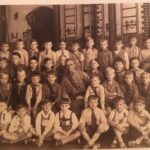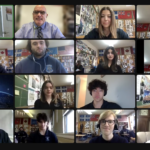Frank Cohn was born August 2, 1925 in Breslau, Germany. Born into a Jewish family, Frank began to understand the realities of Nazism when he was a young boy: an uncle was murdered by stormtroopers, and he saw violence in the streets outside his home. He also compellingly remembers the day his Grade 2 teacher showed up in a Nazi uniform, as well as the indoctrination that started to appear in the classroom. At the same time, German Jews were being increasingly segregated, which to the young Frank took the form of being excluded from the playground. As the restrictions mounted, Frank’s father decided to sell the family business, and he began to look for ways to leave the country. He obtained a visa to visit the U.S., where he hoped to find a way to have relatives sponsor his family; while he was away the Gestapo came looking for him, and the family did what they could to expedite their departure. Frank’s mother wrote his father a letter telling him to stay put, and she was able to obtain visitors’ visas for her and Frank to go to the U.S. They were able to get out of Germany one week before Kristallnacht, arriving in New York and settling in; Frank went to school, and worked on improving his English. When he turned 18, Frank expected a draft notice, and it did come. He viewed it as a chance to pay back the United States, and he was ready to go, only to learn that he was an enemy alien. But the army put him through induction and basic training, actually taking him out for a few days so he could be sworn in as an American citizen. Soonafter Frank was shipped to Europe aboard the Queen Mary; he spent a few weeks in England, and was shipped to England and then France and Belgium. Along the way it was discovered that he spoke German, so the army sent him for a crash course in interrogation in Paris, and suddenly Frank was in army intelligence, tasked with POW interrogation and attached to Bradley’s 12th Army Group. They found themselves right at the center of the Battle of the Bulge, and Frank vividly recalls one night where he was asked to do guard duty. He came through that, and the Americans outlasted the Germans in that monumental battle in the winter of 1944-45. From then on, Frank’s unit followed the front lines closely, interrogating German POWs and doing their best to find war criminals and German military plans. In the final weeks and months of the war, they helped to liberate a Soviet work camp near Wiesbaden, and Frank also was able to meet Russian soldiers as the two armies joined up on Elbe Day. He also joined the ranks of the liberators – soldiers from the Allied armies who stopped the Holocaust and freed a continent from Nazi tyranny. It was too late for many members of Frank’s own family, eleven of whom were murdered during that terrible time. Mr. Masters’ Grade 12 History class was fortunate to be able to zoom with Frank in April 2022.
Videos
Click next video below to keep watching






